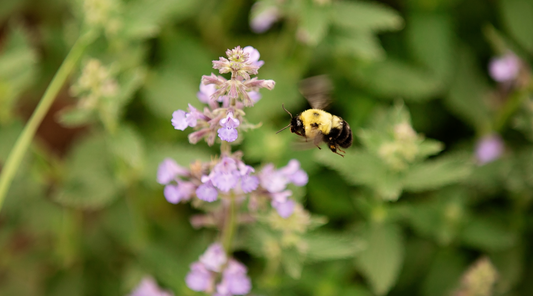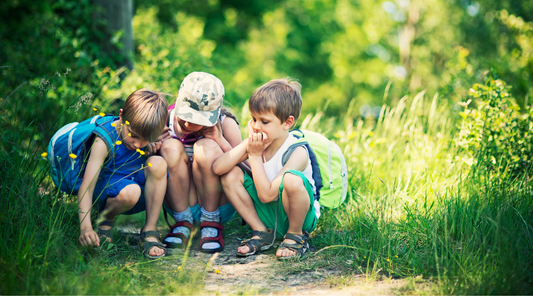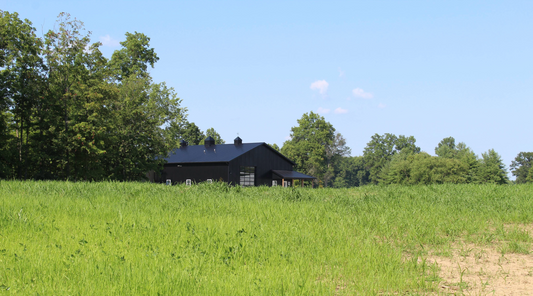
The Socratic Method: Transforming Education in Cincinnati
Ellie, my middle child, was halfway through her sandwich. Aria, my oldest, was almost done with hers. The two of them were sitting across the table, knees bumping under it, giggling over something I didn’t catch.
Then Ellie reached across and grabbed something from Aria’s plate.
Without flinching, Aria stopped her hand mid-air and said, clear as day:
“You cannot have my food. If you try again, there will be consequences.”
Now… this could’ve gone a lot of directions. But it didn’t spiral. No yelling. No meltdown. No tattling.
Just a moment of sincere candor. Spoken by a five-year-old to a two-year-old over a pile of carrots.
That might sound small, but in our home, moments like that are the start of something bigger. Aria wasn’t just being bossy. She was calm, direct, and in control.
And that, in a nutshell, is why we’re building Mission Farmstead’s Farm School around the Socratic Method.

What Is the Socratic Method?
The Socratic Method is all about asking great questions and making room for kids to think.
It’s not a lecture. It’s not memorization. It’s a guide asking something like, “Is it ever okay to lie?” and letting the room stay quiet while kids think.
There’s no single right answer.
One child says yes. Another says, “I disagree, and here’s why.” A third asks, “What if it’s to protect someone?”
And just like that, real learning starts.
Inquiry Based Learning: Not Just Answers, But Ownership
In most traditional school settings, kids are rewarded for getting the “right” answer.
But in inquiry based learning, the reward is the process.
Our goal at the Farm School is not just to teach kids what to know. It’s to help guide them on how to think.
That starts with question based learning:
- What do I think?
- Why do I believe that?
- Can I defend it with respect?

It looks like kids asking:
- "Is it fair?"
- "Could it be done another way?"
- "What happens if I'm wrong?"
It gives them tools they'll carry for life.
Teaching Critical Thinking the Kid-Sized Way
When Aria told Ellie there’d be “consequences,” she wasn’t threatening. She was setting a boundary. She stated the problem. Invited a decision. Explained what could happen next.
She did it all without raising her voice.
And that moment reminded me of a tool I regularly use with adults: the Hard Conversation Framework. It’s a way of coaching to behavior, not the person that looks like this:
“I’ve noticed you’ve done X, and that’s not like you.
Is it because you don’t want to?
Don’t know how to?
Or didn’t know it was expected?”
Now, my daughters don’t use that language word-for-word. But the heart of it? It’s already in them.
That’s what the Socratic Method for kids can unlock.

Socratic Discussion Teaches Emotional Intelligence
We live in a world where disagreement often turns into division.
But when kids learn how to say, “I disagree, and here’s why…” without attacking, dismissing, or shutting down the other person they're learning the core of teaching critical thinking and emotional maturity.
In our farm school for homeschool kids, kids won’t be passive listeners. They’ll be active participants in Socratic discussions that matter every day.
They’ll learn that it’s okay to be challenged. And it’s good to change your mind.
That’s growth. That’s honesty. That’s what makes real dialogue possible.
Self Directed Learning Through Peer Conversations
Kids don’t just need direction…they need room to lead.
When they’re trusted to run discussions, manage ideas, and follow up with each other, they take ownership. They become the drivers of their own growth.
This is where self directed learning really takes off.

And it’s why peer learning matters so much. Kids learn from each other. With each other. Because of each other.
Just like Ellie and Aria at the lunch table: Two kids. One boundary. One clear message. No adult needed.
Problem Solving for Kids Without Jumping In
One of the hardest (and best) things we can do as parents or guides in education is step back.
Let the kids work it out.
The Socratic method for kids gives them a way to do that. It teaches them to problem solve—not just academically, but relationally.
It sounds like:
- "I noticed you're upset - can I ask why?"
- "What do you think we should do next?"
- "Can we try again and do it differently?"
That’s problem solving for kids without panic, without punishment. Just process.
Final Thoughts
If you want your kids to grow in courage and curiosity...
If you believe respectful disagreement is a strength...
If you want to raise thinkers, not just followers...
Then Mission Farmstead’s Farm School for Homeschool Kids might be the right place for your family. Click here to learn more.



